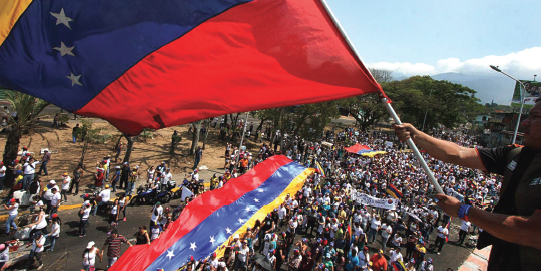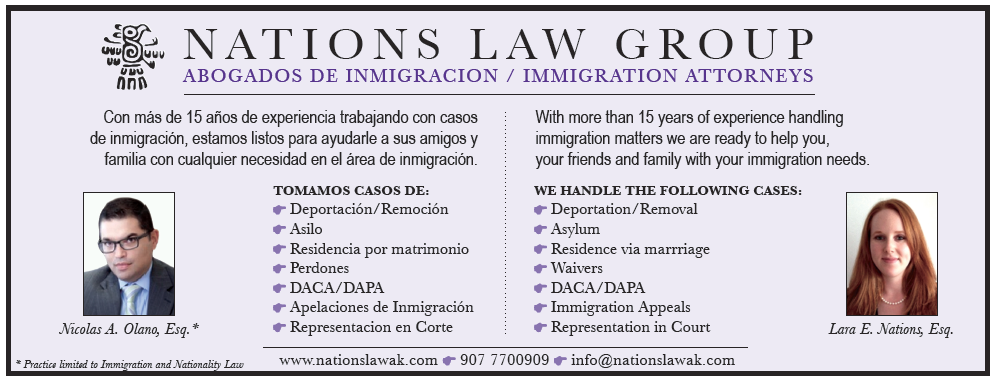Amarillo, Azul y Rojo…
|
|
History books summarize historical events in sentences that narrate, one after another, how the causes and consequences of ideas and events weave the cloth of our present. The succession of the events is then presented as immovable. However, over the last couple of days, the situation in Venezuela has changed my perspective about it. The successions of events that seem, in hindsight, inevitable, are full of uncertainty and questions as they develop. The situation in Venezuela escalated dramatically in the morning of April 30th into yet another dimension of the crisis that has been unfolding for almost 5 months since, when backed up by articles 333 and 350 of the Venezuelan constitution, the President of the National Assembly, Juan Guaidó, assumed the interim presidency of the republic while the citizen Nicolás Maduro after the fraudulent elections of May, 2018, illegally continues to hold power.
After pardoning the famed political leader Leopoldo Lopez, President Guaidó, who is recognized by over 50 nations as the interim leader of Venezuela, called for a military uprising from the base of La Carlota, one of the biggest military bases in the country. The purpose of this was to oust the regime of de facto leader Nicolas Maduro. Juan Guaido finished a successful tour through the Western cities in Venezuela, that have been severely afflicted by the complex humanitarian emergency caused by the Nicolás Maduro regime. In spite of the hard-living conditions, mobilizations were massive, and hope remained in the air. One common theme both in the cities of Maracaibo and Punto Fijo was the presence of flags. In accordance with folklore, the national tricolor has this symbolism: yellow for the gold and natural resources, blue for the sea and sky, and red for the blood spilled by our ancestors. However, I think this symbolism can be used as a framework to understand the context of the crisis in Venezuela given that it can be summarized as three variables: one of resources, one of exodus and the other about the military. The story is about resources. There is a wide variety of mineral reservoirs. Yet, one of those resources became the force that has moved Venezuelan history, oil. According to data from OPEC, the Organization of Petroleum Exporting Countries, mass extraction and processing of petroleum products appeared to be possible for the first time in Venezuela in 1914, and it continued to become more profitable given that the proven oil reserves are the largest of the world. Oil quickly became the heart of the Venezuelan economy. 81% of the export revenue comes from it, according to data from MIT´s Observatory of Economic Complexity. This story is about how, for a while, oil brought economic prosperity but developed an economy dependent on it. The second story is a story about waves of internal exodus. The arrival of the oil industry incentivized inhabitants of highly rural areas to move to the cities. According to a study by María Suarez and Ricardo Torrealba, in 1936, 34% of the population lived in cities. The number increased to 77% for 1971. This placed a constraint in the state. The government could not provide adequate services and inhabitants were isolated in “barrios”, cutting the benefits of the oil revenue to a portion of the population. |
The third story deals with the relationships between military officers and civilians. The country was born after a long independence war that was led by Simon Bolivar. The military leaders close to him were able to permeate into the political culture and give a “militaristic” character. As the economy grew, more civilians wanted to be involved in politics. So, there has been a contrast between civilians and military officers in regard to who should hold office. After the fall of General Perez Jimenez, in 1958, the groups that coordinated his ousting established a deal that would ensure, for the first time in the history of the country, a civilian hegemony. This led to a stable and prosperous democracy with two major political parties: Democratic Action and the Independent Committee for Electoral Political Organization. However, that stability became a fossilization. Presidents kept on returning to office. Both Carlos Andres Perez and Rafael Caldera served two non-consecutive terms in office. Voting rates decreased by almost 40% in the 90’s and the economic situation became unstable as the country entered the global economy.
Hugo Chavez won the presidency in 1998 as a response to that instability. He spoke to those being excluded from the oil bonanza and appealed to the militaristic tradition of politics. He dramatically expanded social programs with the increasing oil revenue at the beginning of the millennium. Although, while doing so, he severely damaged the political ecosystem of the country, violated human rights and made our economy dependent on oil. His successor Nicolas Maduro, by not adjusting the size of the state and drastically increasing repression and corruption, plummeted the country to its current state of affairs. The big lesson of all of this, is that the crisis that currently afflicts the country has been emerging for a long time. What we see right now, is its maximum expression. Important victories have been achieved over the last three months for a peaceful transition away from the Maduro regime and a return to stability. These are reason enough to be hopeful and to continue fighting, flag in hand, for what comes next. |

